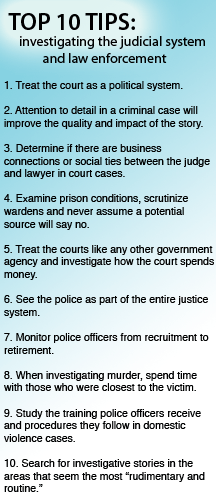March 16, 2009
The Investigative Reporter’s Handbook: Investigating the Judicial System and Law Enforcement
By Ashley Dischinger
One of the important issues discussed in Chapters 10 and 11 of The Investigative Reporter’s Handbook is investigating corruption within law enforcement agencies. It is the duty of a journalist to monitor and report on the actions of the police in order to carry out the watchdog function of the media.
Exposing disability pension abuses by police officers
In 1995, two reporters from Newsday in Long Island won the Pulitzer Prize in Investigative Reporting for their series exposing disability pension abuses by police officers in the Long Island area.
Brian Donovan and Stephanie Saul’s 14-part series initially began when the reporters noticed a boom in disability pension claims that were filed by policemen within the past decade. After many months of thorough reporting they found dozens of cases of police officers unjustly collecting pension payments, and essentially robbing taxpayers of millions of dollars a year.
As described in Chapter 11 of The Investigative Reporter’s Handbook, raises, promotions and pensions are all aspects of local law enforcement agencies that can easily “be riddled with personal favoritism, political intrigue, inefficiency and corruption.”
Law enforcement agencies ‘riddled with corruption’
Newsday questioned the possible link between pension payments and loopholes in the police disability system. Their investigation held these police officers accountable for their misdeeds that plagued the Long Island law enforcement system with corruption and inefficiency.
Donovan and Saul’s reporting highlighted a severe flaw in the system and the shocking number of officers who were taking advantage of loopholes. During the initial stages of their investigation they followed both people trails and “the money” to determine motives behind officers abusing pension.
Taking advantage of public resources
The reporters used various resources including public records of disability pension claims in the Long Island area. They also studied documents detailing the police disability system.
The use of these public documents allowed the Newsday team to obtain data specific to their case, including the exact amount of annual disability pension received by many young officers. One 30-year-old officer received $60,471 a year, tax-free according to their research.
Following people trails
Donovan and Saul followed people trails throughout the investigation by using connections to find more sources. Various case studies of sources revealed that many officers file for pension if they are facing criminal charges because if the officer retires early on disability, all criminal charges are dropped. One officer filed for disability pension payments and continued drug dealing.
The Newsday team also found that Long Island has strong police unions that have close ties to many law firms. This makes expert legal representation available for free, whether they are officers convicted of crimes or those injured by criminals.
Newsweek ‘watchdogs’
The work of Donovan and Saul exemplifies how investigative reporting can hold law enforcement agencies accountable for corruption. As The Investigative Reporter’s Handbook says, local police “are entrusted with great power and are a part of daily life.” It is therefore necessary for journalists to continue scrutinizing the actions and behavior of police officers, and in the case of this investigation, to scrutinize the disability pension system.